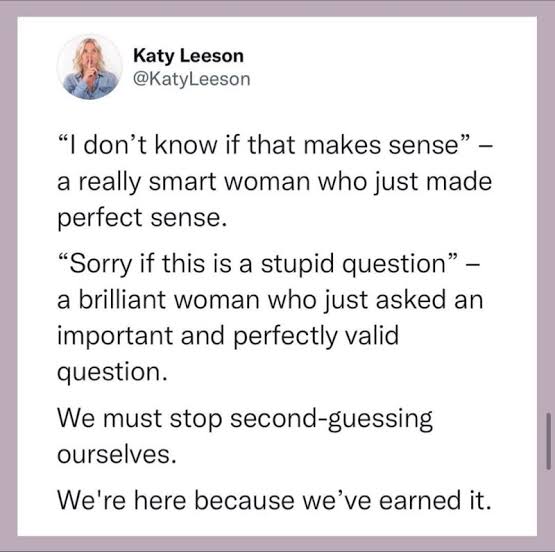Good morning, friends. It's Rohan with your latest Career Supplement, your personal mentorship email that takes a few minutes to read, but contains stuff that will speed up your career by years. |
Today, I wanted to go through mistakes I see people make that reduce their credibility and trustworthiness at work. It's often about the words we use without even thinking. If you find yourself making these mistakes, it's time to course correct! |
To my career-focused readers: I've been much more active on LinkedIn lately, sharing bite-sized, candid career advice for quick boosts throughout your week. It's an easy way to stay motivated and keep your career on track. So if you like my writing, follow me on LinkedIn and say hi! |
Estimated read time: 5 minutes 40 seconds |
|
📈 Mentor's Corner Insights put together by me or coaches who usually charge $750+/hour and mentor senior execs. One practical lesson a week that will make a measurable impact on your career, delivered right to you — for $0. |
|
|
Things you say that'll lose you credibility |
Credibility is about being trusted and seen as good at your job. It's what makes people believe in you, listen to you, and follow your lead. |
I like to say credibility is your professional "currency." |
The more credibility you have, the more trust people put in you. That means you get to do more important work, lead bigger teams, and get promoted more often. |
And when you have less credibility, it's tough to get your team to listen or agree with you, or seniors to trust you. It makes your job much harder. |
The problem: |
Some of the ways you can lose credibility are quite counter-intuitive. |
So, to help you build a nest egg of credibility at work, here's a few credibility "killers" we should be careful to avoid. |
😕 "Does that make sense?" |
I used to be really bad at this one! |
When you're giving a presentation and you see confused faces after delivering a lot of information, it's tempting to say, "Does that make sense?" |
But here's the problem: |
It subtly hints that the problem is with your presentation (or presentation skills), which decreases your credibility. (Did Steve Jobs ask, "does that make sense?" while unveiling the iPhone? I doubt it.) |
Use this instead: |
|
 | couldn't agree more. "stop second-guessing yourself". |
|
| | | | …by the way, if you use LinkedIn, go to my profile and hit the 'Follow' button. I share a mix of practical career strategy and mid-week motivation — stuff that makes it easy to keep your career on track.
Topics coming up this week: hacks that make me seem like a better public speaker than I actually am (just posted an hour ago), how to disagree with your seniors + more. See you there. | alright, let's get back to my essay… |
| |
| | |
|
🐺 Always crying "wolf" |
Over-exaggerating problems will make you lose credibility at work. |
For example: |
If you're a manager and you're constantly telling your sales team that every potential deal is "make or break" for the company, you're slowly etching away at your credibility. When a seriously large deal comes your team's way, your attempts to rally support and resources won't be taken seriously enough. |
Similarly, if each time you run into an issue at work and bring it up in team meetings as a big deal, you're gonna make a name for yourself as the person who makes mountains out of molehills. |
Then, when something actually is really bad, you're going to be the classic "boy who cried wolf". |
Of course, you might need to sometimes complain about, or exaggerate some things, to get what you want at work. But, always doing it is a credibility killer. |
|
🔜 "I'll do it tomorrow." |
There's only one occasion when you can get away with saying this - when you're actually going to do it tomorrow. |
But every other time? |
It's a credibility-killer. |
Because when we promise people things we can't deliver, it erodes their trust in us, and leaves our word worthless. |
If you don't know when you can get something done, resist the temptation to commit / people-please. Instead, say this: |
|
|
📅 Stick to meeting commitments |
I had a manager who was always late. Not just by 5 minutes, but often 20, 30, or he'd even miss meetings. Worse, he'd let his disregard spill over into the next meetings, often causing those to start late or run over too. |
He was super senior, so I feel he thought he could get away with it. |
And sure, no one in his team said anything. But we all had little respect for his word. Among us, he had no credibility => lower professional currency. |
No matter how senior you are, don't take people's time for granted: |
If you're going to be late, send a note in advance. If you're running a meeting, stick to the time you scheduled in. If you need more time, explicitly ask if everyone can stay longer.
|
Your word matters (not just at work, but in life). Don't get into the habit of not sticking to it. |
 | (kinda unrelated but made me giggle) |
|
⛓️ Barbed statements |
"You never do anything right." "Why do you never listen?" |
Everyone makes mistakes, and there's gonna be times in our careers when we need to call people out. The problem here is getting carried away by our emotions, and making broad statements with words like never. |
I call these statements "barbed". Because like a barbed fish hook, once they go in, it's very hard to get them out. |
Why are they dangerous? |
Because statements like "why do you never listen?" are always false. People do listen. Just not all of the time. |
Remember, correct the action, not the colleague. |
That's a wrap. I'll get into some more credibility killers over on LinkedIn and perhaps in a future email — reply back if you have any language pointers that have helped you through your career! I'll save them for later. |
And if that struck a chord, please do either one of the following: |
Forward this email to people who might need it, and tell them about my emails. It takes me ~20 hours researching and writing each of these coaching emails. Sharing it takes just 10 seconds and helps me get my thoughts out there. Leave a review on my emails! I'd love to know what part resonated most and how I can make the next one better.
|
Sharing/reviewing really does help get my writing out there (and makes it all worth it). Thank you! |
|
From Our Team Tried all our AI tools? | Want a better resume? Upload it to Score My Resume and get expert feedback, instantly. You'll find out if and where your resume falls short. Get your resume review |  |
| Want to make your LinkedIn profile work for you? LinkedIn Review will show you how to optimize it so you get more leads, jobs and opportunities through LinkedIn. Optimize your profile |  |
| Want to get past the ATS? Targeted Resume will check if your resume has the right keywords. Target your resume |  |
| |
|
|
|
|
|
|
Imagine how many meetings this would save 🤣 (link if the image doesn't load) |
|
🔎 Speed Up Your Job Search One actionable piece of advice to help you hack your job search. |
Why and how you should quantify your resume |
Read the full article here. |
When friends come to me for help on their resumes, the most impactful change I tell them to make is to use specific hard numbers when talking about their accomplishments. |
I'll use an example to explain... |
Here's a bad line I might see on a resume: |
|
This is a pretty biased statement. Just because you say you have excellent design skills doesn't mean a hiring manager is going to believe you. |
Let's transform this by using hard numbers and being more specific: |
|
Note how we use a hard number, specifically the time you saved, to show hiring managers how our work made an impact on our employer. |
This is called 'quantifying' your bullet points. Hard numbers support your narrative and, on your resume, make your skills undebatable. |
🎯 You should use a tool like Score My Resume to find out if your resume is effective enough. It'll analyze each line on your resume, plus the Magic Write feature will give you ideas on how to quantify your bullet points, even if you haven't worked in a sales role or don't have access to numbers. |
|
|
If you're new here, let's get the intros out of the way. |
I'm Rohan. Six years ago, I found myself frustrated with the sea of misleading career advice online, so I started Resume Worded. The goal was simple: provide guidance that actually works. |
But resumes were only the tip of the iceberg. There was a lot of clichéd, generic career advice out there. So, I started this email series. Each week, I talk about real career strategy, informed not only by my experiences but by my conversations with industry leaders, senior coaches who train CEOs, and people with way more experience than I have. |
Every email you receive is written by me, not a ghostwriter. I'm here, on the other end, reading your replies. |
Until next time, |
|
Rohan @ Resume Worded |
|
|
What'd you think of today's edition? |
👍 I loved it. |
🤔 Pretty average, step it up. |
🤢 You didn't bring enough value. |
Here's a review of last week's email — I appreciate it Sherri! |
|
|
P. S. To make sure your career never goes off the rails, don't miss my future emails. A simple way to make sure you get each email is: |
If you're using Gmail, hit the 3 dots at the top-right corner, and choose Move to -> Primary. Or drag this email to Primary if you're on your computer. If you're using Apple Mail, tap on our email address at the top of this email (next to "From:" on mobile) and click "Add to VIPs.".
|
|
Comments
Post a Comment